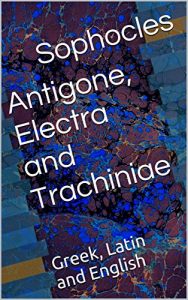In Antigone, Sophocles explores the consequences arising from a tyrannical dictator’s imposition of arbitrary dictates on an individual’s rights to religious freedom; Antigone’s desire to follow her religious beliefs and perform time honored rituals and traditions leads her to refuse to obey Creon’s perverse edict that her brother not be buried.
In a contrary case, in Electra, the main character and her brother Orestes avenge their mother’s murder of their father Agamemnon. Their murder of Clytemnestra violates the most sacred and inviolable of familial relationships, and allows Sophocles to examine the complexity of religious obligation.
Finally, in Trachiniae, Sophocles examines the question of innocent culpability, and the horrific consequences of love and trust betrayed. Deianeira’s innocent attempt to regain the affection of Heracles leads to her own suicide and the unendurably excruciating death of her husband.
Three of Sophocles’ best plays, presented with the original Greek text, a close Latin translation, and the well known Oxford translation edited by William Buckley.
In a contrary case, in Electra, the main character and her brother Orestes avenge their mother’s murder of their father Agamemnon. Their murder of Clytemnestra violates the most sacred and inviolable of familial relationships, and allows Sophocles to examine the complexity of religious obligation.
Finally, in Trachiniae, Sophocles examines the question of innocent culpability, and the horrific consequences of love and trust betrayed. Deianeira’s innocent attempt to regain the affection of Heracles leads to her own suicide and the unendurably excruciating death of her husband.
Three of Sophocles’ best plays, presented with the original Greek text, a close Latin translation, and the well known Oxford translation edited by William Buckley.






